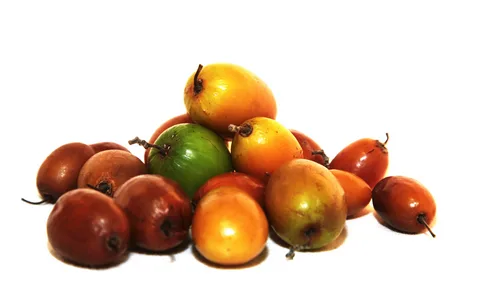
What Is Jujube Fruit? Nutrition, Benefits, and Uses
Jujube fruit, also known as red dates or Chinese dates, is a small, sweet fruit native to China but widely cultivated in many parts of Asia, Europe, and North America. With a long history of use in traditional medicine and culinary traditions, jujube fruit offers an array of nutritional benefits and versatile uses. In this comprehensive guide, we’ll explore the nutritional profile of jujube fruit, its health benefits, culinary uses, and more.
Understanding Jujube Fruit
What is Jujube Fruit?
Jujube fruit, scientifically known as Ziziphus jujuba, is a member of the buckthorn family (Rhamnaceae). It grows on deciduous shrubs or small trees that can reach up to 10 meters in height. The fruit is oval-shaped, typically ranging in color from light green to reddish-brown when ripe, with a sweet, crisp flesh and a single seed in the center.
Nutritional Profile of Jujube Fruit
Jujube fruit is a rich source of vitamins, minerals, and antioxidants. Here’s a breakdown of its nutritional composition per 100 grams:
- Calories: 79 kcal
- Carbohydrates: 20.2 g
- Fiber: 3.9 g
- Protein: 1.2 g
- Fat: 0.2 g
- Vitamin C: 69 mg (115% DV)
- Vitamin A: 40 IU (1% DV)
- Potassium: 250 mg (7% DV)
- Iron: 0.48 mg (3% DV)
- Calcium: 16 mg (2% DV)
Health Benefits of Jujube Fruit
Rich in Antioxidants
Jujube fruit contains various antioxidants, including flavonoids, phenolics, and vitamin C, which help neutralize harmful free radicals in the body and reduce oxidative stress.
Supports Digestive Health
The fiber content in jujube fruit promotes digestive regularity and helps prevent constipation. It also contains compounds that may have a mild laxative effect, supporting overall digestive health.
Boosts Immune Function
The high vitamin C content in jujube fruit plays a crucial role in supporting immune function by enhancing the production of white blood cells and antibodies, which help fight off infections and illnesses.
Regulates Blood Sugar Levels
Jujube fruit may help stabilize blood sugar levels due to its moderate glycemic index and fiber content, which slow down the absorption of glucose in the bloodstream.
Promotes Relaxation and Sleep
Jujube fruit contains compounds such as flavonoids and saponins that have calming and sedative effects on the nervous system, promoting relaxation and improving sleep quality.
Culinary Uses of Jujube Fruit
Fresh Consumption
Jujube fruit can be eaten fresh, enjoyed as a healthy snack, or added to fruit salads for a sweet and crunchy texture. Choose ripe jujubes with a firm texture and vibrant color for the best flavor.
Dried Jujubes
Dried jujubes are popular in many Asian cuisines and can be eaten as a snack or used in various recipes. They have a chewy texture and concentrated sweetness, making them a delightful addition to baked goods, trail mixes, and desserts.
Jujube Tea
Jujube tea is a soothing and aromatic beverage made by steeping dried jujube slices in hot water. It’s commonly consumed for its relaxing properties and pleasant flavor. You can enjoy it hot or cold, sweetened with honey or other natural sweeteners if desired.
Jujube Jam or Jelly
Jujube fruit can be cooked down into a delicious jam or jelly, which can be spread on toast, biscuits, or used as a topping for yogurt or ice cream. Its natural sweetness and subtle flavor make it a delightful addition to breakfast or dessert.
Jujube Extract or Tincture
Jujube extract or tincture is made by steeping dried jujube fruit in alcohol or glycerin to extract its beneficial compounds. It’s often used in traditional medicine for its calming and adaptogenic properties.
FAQ Frequently Asked Questions
Can jujube fruit be eaten raw?
Yes, jujube fruit can be eaten raw and enjoyed as a fresh snack. Choose ripe jujubes with a firm texture and sweet flavor for the best taste.
Is jujube fruit high in sugar?
While jujube fruit contains natural sugars, it has a moderate glycemic index and is lower in sugar compared to many other fruits. Enjoy it in moderation as part of a balanced diet.
How should I store fresh jujube fruit?
Fresh jujube fruit should be stored in a cool, dry place away from direct sunlight. They can also be refrigerated in a perforated plastic bag for extended freshness.
Can jujube fruit help with anxiety or insomnia?
Some studies suggest that compounds found in jujube fruit may have calming and sedative effects on the nervous system, potentially promoting relaxation and improving sleep quality. However, more research is needed to confirm these effects.
Are there any side effects or contraindications associated with jujube fruit?
Jujube fruit is generally safe for most people when consumed in moderation as part of a balanced diet. However, individuals with allergies to related plants in the buckthorn family or those taking medications should exercise caution and consult with a healthcare professional before consuming jujube fruit or supplements.
Can jujube fruit be used in cooking or baking?
Yes, jujube fruit can be used in cooking and baking to add natural sweetness and flavor to a variety of dishes. It can be incorporated into sauces, marinades, desserts, and more, providing a unique and delicious twist to recipes.
Where can I purchase jujube fruit or products?
Jujube fruit and products such as dried jujubes, jujube tea, and jujube extract can often be found in specialty Asian markets, health food stores, or online retailers. Choose organic and high-quality options whenever possible for the best taste and nutritional benefits.
Conclusion
Jujube fruit, with its sweet flavor, nutritional richness, and versatile culinary uses, is a delightful addition to a healthy diet. Whether enjoyed fresh, dried, brewed into tea, or incorporated into various recipes, jujube fruit offers a host of health benefits and culinary possibilities. By understanding its nutritional profile, potential health benefits, and culinary uses, you can make the most of this ancient fruit and explore its many delights. So why not add some jujube fruit to your next shopping list and experience its unique flavor and nourishing properties for yourself?



